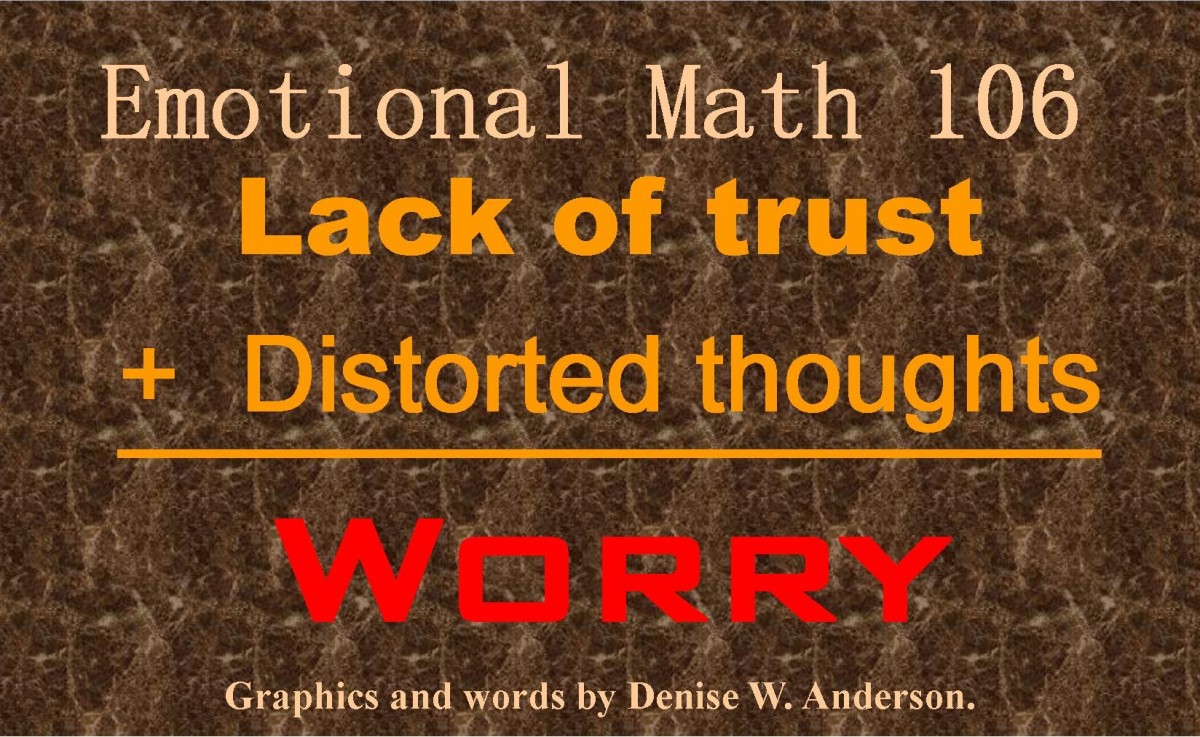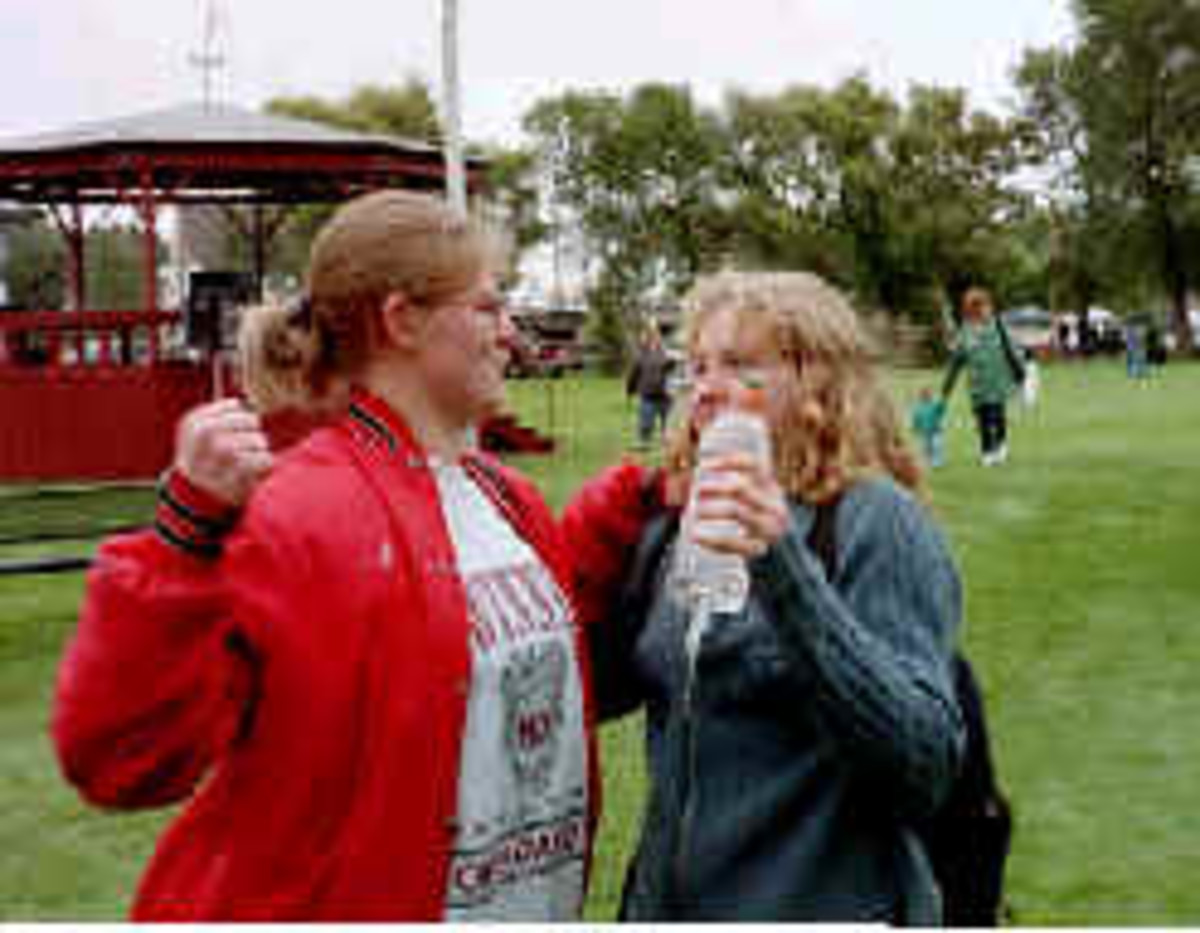- HubPages»
- Health»
- Mental Health»
- Emotions
How Can I Stop Worrying?

Are you worried?
"My stomach just won't stop churning!"
"I wake up in the night and my mind comes alive with all sorts of thoughts."
"I can't seem to concentrate. I lose track of what I am doing."
"I don't want to go there. Last time I did, things did not go well for me."
These statements sound like they are stress related, but in reality, they come from worry. Things are happening in our world that seem out of our control, and in the back of our mind, little red flags are going up. Our body reacts similar to when we are faced with a dangerous situation. Our stomach secretes more acid, our muscles get tense, and our mind is on the lookout for a way to escape.
Worry can be a stressful experience, and is often the cause of long-term health issues. The following paragraphs help us to understand what worry is, where it comes from, and how we can stop it.
...there are those of us who are incessant, chronic worriers. We worry about all the negative things that could happen, but usually don’t....
— Paul H. DunnWhat is worry?
According to the Google dictionary, worry is allowing ourselves to "give way to anxiety or unease" or allowing ourselves to "dwell on difficulty or troubles." Synonyms are "fret," "agonize," "overthink," and "panic."
When we worry, we project ourselves into the future and think about all the things that might happen if something goes wrong. Worry is often a secondary emotion. We feel fear or anger and when these emotions are left unresolved, we continually think about the problem and our thinking processes become flawed. We know it is worry when physical symptoms manifest themselves. See the table below for examples:
Body System
| Symptom
|
|---|---|
Nervous System
| Headaches
|
Gland System
| Stomach rumbling
|
Digestive System
| Loose stools
|
Musculo-Skeletal System
| Muscle tension and pain
|
Cardiovascular System
| Racing heart
|
Where does worry come from?
Worry can be a symptom of several different issues:
1) not accepting our present circumstances
Focusing on the imperfections of our current circumstances often leads us to choose to live in the future instead. We set aside the now and decide what we want to have happen, and then live as if it already has. This gives rise easily to misunderstandings and regret.
2) thinking that our needs will not be met
One of the main issues with worry is our lack of trust that our needs will be met. We know from past experience that when certain things happen, our needs are sacrificed. Our mind grabs hold of these insecurities and blows them out of proportion. Rather than doing what it takes to make sure our needs are met, we live in constant anxiety that they will not be.
3) lack of trust in what we perceive to be a flawed system
Worry can come from our perceptions of how things work. When we don't see the system working in our favor, we live in constant state of anticipation toward a negative outcome that eats away at our feelings of well-being until we become physically ill.
4) unbelief in a higher power
Worry at its worst comes from our lack of faith in a God who loves us and cares for us. Perhaps bad things have happened in the past, and we are unsure of where we stand with God, or begin to wonder if he is even there. We don't know where we can turn for stability and strength, therefore, we automatically worry.

How do we stop worry?
We can only stop worry when we understand the thought patterns that lead to it. They include the following:
- What if questions
We wonder what will happen if others reject us or we fail to meet expectations that have been set for us. Although we don't know that these things can and will happen, we think that they might, therefore, we project ourselves into the situations. We see the outcomes as negative, and this undermines our feelings of self-worth. There are two ways to stop "What if..." questions. We can either go so far as to make them ridiculous, and then laugh at ourselves, or simply say "Stop!" in our minds. The key is to realize that these types of questions are not realistic and we just don't have to go there!
- Assumptions
We often base our plans on assumptions that we make. We think we know what other people are thinking, therefore, we assume we know. Unfortunately, this leads to misunderstandings and problems as our assumptions are most often colored with negativity. We assume the worst rather than trusting in the best. In order to stop assumptions, we must check them out. If we think we know what someone else is thinking or doing, we ask, and get the story straight from them. That way, the information we use to make decisions will be founded on fact rather than fantasy.
It has been from the beginning and it will be till the end that the natural man will have a tendency to rationalize and to blame his behaviors on others or on certain circumstances.
— L. Lionel Kendrick- Exaggeration
Just like a news reporter that is looking to sell a story, we make reality look bigger than it really is. We skew the details to make it sound more sensational in order to get a reaction out of others. This practice quickly escalates our worry to the point of anxiety. The key to stopping exaggeration is in recognizing it for what it is. Like stopping a run away horse, it is necessary to rein in our desire to be the biggest and the best, even if it is in telling the negative! Once we accept things the way the really are, there may be no reason to worry!
- Blaming or faultfinding
Lack of acceptance of our current circumstances often takes on the guise of blaming someone else for what is happening to us. It puts the control out of our hands, and leaves us wondering just how things are going to work out. We take on a victim mentality, weak and vulnerable to the whims of others. In order to stop blaming or faultfinding, it is necessary to accept our own role in where we currently are. This may be difficult, and takes humility. It means looking at ourselves in the mirror and asking some soul searching questions about our own strengths and weaknesses.
- Doubt
Doubt is probably the number one reason for worry. We doubt God's love for us. We doubt that we have the strength to face what we are going through. We doubt that others have feelings of esteem for us, and we doubt that there is any hope for the future. The anecdote for doubt is a strong dose of faith: faith that God is really there, that he loves us as his children, and that he wants what is best for us. Once we base our actions on these undeniable truths, our world changes color from negative to positive. We trust that all things will work together for our good.

When we worry, the world takes on a myriad shades of gray. We loose the brightness of hope that allows us to see the good around us, and our feelings of self-worth hit an all-time low. Recognizing and refuting the distorted thought patterns that make up our worry breaks through this film of negativity and allows the sun to come through brightly.
We are able to go forward with our lives, knowing that all things will work together for our good, and that even when there are difficulties or problems, we have the ability to work through them and move on.
Our emotional health becomes an anchor for positive action and we live in such a way that we become a blessing in the lives of those around us. Whereas before, worry would drag us down, we now have the time and energy to enjoy life.
© 2016 Denise W Anderson








